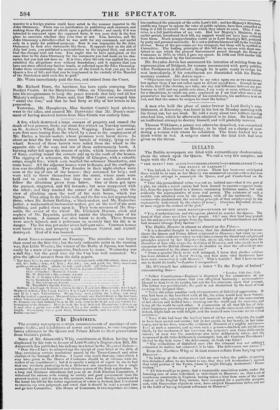Vrobincrs.
The country newspapers contain announcements of meetings of cor- porate bodies, and inhabitants of towns and counties, to vote congratu- latory addresses to the Queen and Prince Albert on their preservation from Oxford's pistols.
Some of Mr. Ainsworth's Whig constituents at Bolton having beets .displeased by his vote in favour of Lord Stanley's Registration Bill, Mr. Ainsworth has published his defence in a letter to the Mayor of Bolton-
" Dear Sir—I have to acknowledge the receipt of your letter of the 29th of May, containing certain resolutions passed by the Town-Council and other electors of the borough of Bolton. I regret very much that any votes which I may have given in the House of Commons should be at variance with the wishes of my constituents; but it is equally a subject of regret to me to find that one similarly prolbssing to be a Reffirmer can countenance for a single moment the present fraudulent mid vicious system of the Irish registration. In a long and laborious attendance last year on an Irish Election Committee, I witnessed the serious evils arising to society and good government from the present system ; and it was on this account, when Lord Stanley introduced to the house his bill for the better registration of voters ie Ireland, that I ventured to exercise my own judgtnent, and voted that it should be read a second time and go into Committee. The house of Commons, in two important divisions, has confirmed the principle of the noble Lord's bill and her Majesty's Minisatter: unable any longer to oppose the voice of public opinion, have been compelled to bring in a bill to correct the abuses which they admit to exist. This, I con- ceive, is a full justification of my vote. Had her Majesty's Ministers, earlier period, introduced their bill, my support would not have been withheld from them. Mush misapprehension exists as to Lord Stanley's Bill, produced, by party and personal animosity. It is not a disfranchisement bill to the tondfide elector. Some of the provisions are too stringent, but these will be rectified in Committee. The leading principles of this bill are in unison with those con- tained in one which the present Government passed through the House of Commons in 1835, to which I gave nu assent. In 1836 and 1838 similar bills were also introduced by the Government."
Mr. Swynfen Jervis has announced his intention of retiring from the representation of Bridport, for reasons unconnected with party polities, when Parliament is dissolved ; though he is quite ready to resign his seat immediately, if' his constituents are dissatisfied with his Parlia- mentary conduct. Mr. Jervis says-
" Objections may have been made to toy votes upon one or two occasions; but against these I am not called upon to defend myself here. Enough for me to state, that if the electors, as a body, see any real difference between my pro- fessions in 1837 and my public acts since, 1 UM ready at once, without waiting for a dissolution, to vacate my seat ; convinced as I um that when once a re- presentative has lost the confidence of his constituents, his usefulness is at an end, and that the sooner he resigns his trust the better."


























 Previous page
Previous page